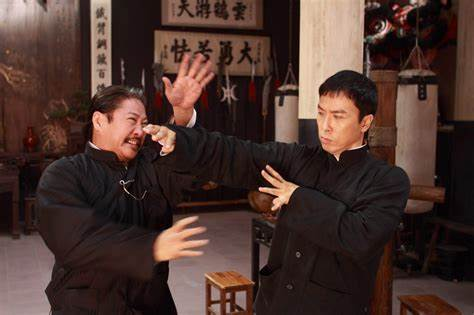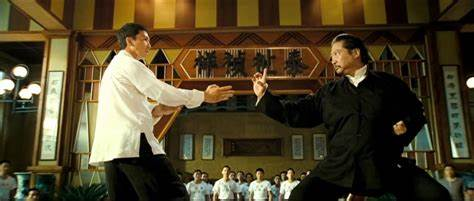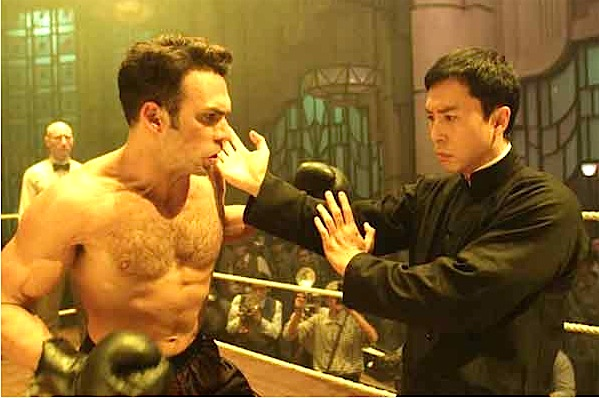IP Man 2: Solid, yet flawed sequel.
Firstly, I'd like to apologize for having been gone for a couple of weeks. I had planned to take at least a week off for Easter but, circumstances forced me to postpone this blog post for another week. During my time off, I got to thinking and now am planning on avoiding IP Man 3 and 4 as they suffer from Sequelitis with diminishing returns. They do have positives such as introducing legends such as Mike Tyson, Max Zhang and Scott Adkins to the franchise. All 3 have great fight scenes with Tyson in particular being surprisingly good in his role. Plot wise though, they aren't the greatest and leave a lot to be desired. I firmly believe that 2 films would have been enough. Now that that's out of the way, let's begin.
The sequel begins where the first movie left off, shortly after Ip Man defeated General Miura in a martial arts contest. After having been unsuccessful in their first attempt to flee to Hong Kong, Ip Man and his family succeed after Miura's defeat. Once safely in Hong Kong, Ip Man opens up a Wing Chun school. Unfortunately for the protagonist, no one in Hong Kong seems to be aware of his heroics and as such, he struggles to gain any students. In a stroke of good fortune, a local fighter named Wong Leung arrives at the school and challenges Ip Man to a fight. Ip Man easily bests the young upstart almost effortlessly. Feeling ashamed due to the defeat, Wong cowardly returns with a few of his friends to again challenge the Wing Chun master. Ip Man easily dispatches his opponents. This leads to Wong Leung and his friends being greatly impressed with Ip Man's skills and offer to become his first students.
Ip Man and his school's growing popularity eventually leads to conflicts with other local schools. One such conflict sees Wong and his friends involved in a fight with Hung Gar students. Ip Man intervenes and is aided by former rival, the now reformed Jin Shanzhao, in a really neat touch and a solid appearance from Louis Fan. The Hung Gar student's own teacher, Master Hung, also intervenes and states that Ip Man must prove his skills to the various teachers of local martial arts schools in order to establish his own martial arts school. Ip Man accepts and this leads to my personal favourite part of the movie as the protagonist faces off against various opponents with different fighting styles. Ip Man defeats two of the masters before earning a hard fought stalemate with Master Hung. This is one of the best sequences of the entire franchise and it's always good to see legends like Donnie Yen and Sammo Hung face off. Needless to say, with him having proven his skills, Ip Man earns the approval to run his Wing Chun school. He does decline the membership fees to be apart of the kung fu masters association in Hong Kong as he disproves of them. His disapproval is well-founded as the membership fees are actually a part of a protection racket that the corrupt Superintendent Wallace of the Hong Kong police had coerced the masters into.
Having gained respect and admiration for Ip Man, Master Hung invites the protagonist along to a scheduled bout with British boxing champion, Taylor "The Twister" Milos. It is here that the nationalistic undertones, if you could call them such, make their reappearance after having been present in the first movie. Much like General Miura from the first movie, Taylor "The Twister" Milos is a foreign adversary for the protagonist to overcome. This is another antagonist that is quite vocal about his disdain for the Chinese and takes great pleasure in beating them in the ring. He's positioned as a grave threat and an evil for the protagonist to overcome. It's quite like the wrestling gimmick and trope of evil foreigner for a national hero to defeat. It's quite prevalent in movies and tv shows as well. That being said, it doesn't take away from the enjoyment of this movie. It's quite the thrill to see a villain being built up as a huge obstacle for the hero to beat.
What I really love about Ip Man 2 is the extra emphasis on Wing Chun vs various other martial arts forms. Demonstrating this masterfully, is the scene that sees Ip Man take on three successive opponents as he attempts to prove his skills to the local martial arts masters. The three different styles are Monkey Fist, Baqua Zhang and Hung Gar respectively and the duels all take place on a round table top. It's reminiscent of kung fu movies of old such as those made in the 70s and 80s and showcases the various movements and techniques of the various styles to tremendous effect. Credit also has to be given for the set and production design for this scene as the setting of the table top whilst it moves as the fights go on is brilliant. It is also this scene that gives us the clash of legends, Donnie Yen and Sammo Hung. These two always bring their A game to every encounter such as in Ip Man 2 or SPL. In this particular instance, they move with such speed and precision that within the space of about 10 seconds, they trade triple digit punches! This scene also brings emotional depth to the later scenes and the respect between the 2 masters.
Darren Shahlavi stands out in this movie for several reasons. Firstly, as a man known for his incredible kicking ability, he portrays the role of a boxer and thus limits himself to only punching and yet, succeeds fantastically. As Twister, he has a great on screen presence and in a certain way makes the final third of the movie reminiscent of Rocky IV. He's physically much larger and stronger than Ip Man and is a downright vicious behemoth with an arrogant streak to boot. His fight scenes with Yen and Hung are amongst the best and most brutal in the franchise. The final fight scene is filled with emotion and with the awesome action choreography and direction, every shot can be felt.
All in all, I believe that this movie solidified Donnie Yen as the very best cinematic Ip Man. It also delivered on the action, direction, cinematography and performances. It's well worth a watch for any fans of action and martial arts movies. It's the best sequel before the series dragged on too long and began feeling like a typical China Good, foreigner bad movie often found in mainland China productions.





Comments
Post a Comment
Please be respectful. It's ok to disagree and debate topics, but in a polite manner.